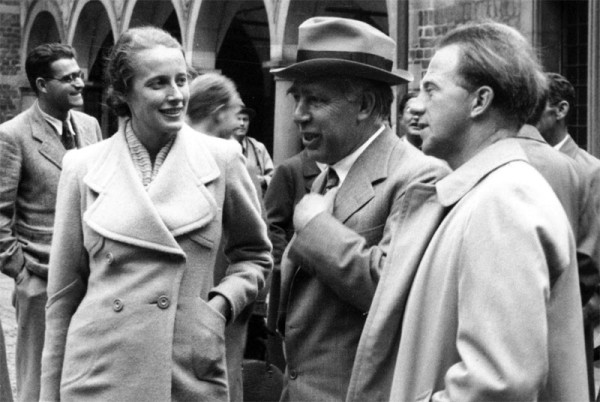
Werner Heisenberg (at right) with Niels Bohr (center) and Elisabeth Heisenberg (left), 1937. (Victor Weisskopf makes a cameo appearance on the left, in the back.) Source: Emilio Segrè Visual Archive, American Institute of Physics.
Did Heisenberg try to sabotage the German bomb project? Does the failure of the Germans to produce a bomb during World War II reflect on Heisenberg’s technical knowledge, his moral choices, or Allied sabotage? What do historians think, in the end, that Heisenberg was trying to do when he visited his mentor Niels Bohr in occupied Copenhagen in the fall of 1941?
These questions, often without saying so explicitly, tend to stem from one source these days: Michael Frayn’s Tony Award-winning play Copenhagen, first performed in 1998 but often re-performed, and having also been turned into a PBS film in 2002.
This pair of questions, as a pair of cities (Hiroshima and Copenhagen), is interesting to me as a historian. These appear to be the touchstone of American intellectuals’ knowledge of nuclear history, broadly speaking. One rooted in a controversial act of war, the other in a controversial piece of theatre. It is, perhaps, more of a testament to the theatre to get people (at least some people) thinking about history than one might typically suspect — that Americans think about Hiroshima is perhaps as it ought to be, that they think about Copenhagen is far more curious.
When I was an undergraduate majoring in the history of science at UC Berkeley in the early 2000s, Copenhagen was very much in the air. It had just come to America (I saw the San Francisco production twice), and it resulted in the early release, in 2002, of several sealed letters in the Niels Bohr Archive relating to Niels Bohr and Werner Heisenberg’s 1941 meeting. My undergraduate advisor was a Heisenberg scholar, and I took several classes with her that touched very directly on the history of the American and German bomb projects. One of my last acts at Berkeley was to design the cover for an excellent volume of historical essays on the play. So the play has had a remarkably large role in my early interest in nuclear history.
Last fall I was asked to take part in a Q&A about the play at the Central Square Theatre in Cambridge with Alan Brody of MIT, where it was showing. Aside from giving me a chance to visit my old grad school stomping grounds (the first time, I think, since I started my current job), it also gave me a fresh excuse to revisit the play, about a decade after I last spent any real time thinking about it. What follows is based on what I said at the panel.
What did Heisenberg and Bohr talk about in 1941? I think the main response from historians that you are likely to get is: we’ll never know, and it probably isn’t that important in the scheme of things anyways. Which is to say, not much of an answer. All we have to go on regarding that conversation are a few later recollections from the only two people who were there — Bohr and Heisenberg — and all of those recollections have been fairly “tainted” by quite a lot of other events that came afterwards, and do not match up with each other. What I mean by “tainted” is that there became high stakes for both sides for remembering the events in different ways, and the effects of the successful Allied atomic bombs, coupled with the full revelation of the crimes of Nazi Germany, makes it hard for anyone to be anything like objective after the fact.
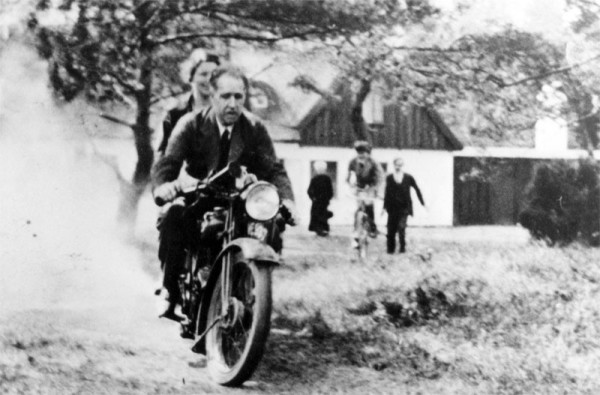
Niels and Margrethe Bohr, on the motorcycle of George Gamow, 1930. Source: Emilio Segrè Visual Archives, American Institute of Physics.
The Bohr letters released in 2002 are an example of this. Bohr’s letters to Heisenberg, which are very condemnatory, have been sometimes naively cited as “proof” of whatever took place. They are not. They were written after Bohr had read an account of the German bomb project (Robert Jungk’s Brighter than a Thousand Suns) which implied (in a footnote) that Heisenberg was claiming to have sabotaged the German project on moral grounds. Bohr, infuriated that Heisenberg might be saying such a thing, wrote a strongly-worded language arguing for the opposite. Historians now know — having looked at Jungk’s papers — that in fact Heisenberg’s letter to Jungk was mis-quoted by the latter, missing sentences where Heisenberg clearly backs away from such an implication. In any case, the point is simple enough: Bohr’s letters, written a decade later, were the angry assertions of someone who thought Heisenberg was trying to make a specific sort of claim, and Bohr was intent on disabusing him of the notion. One might also point out (as the play does) that in the end, Bohr was the one who did contribute towards making a weapon of mass destruction, not Heisenberg, and for Bohr to think that Heisenberg was attempting to claim a moral high-ground as a result would have been particularly galling.
It doesn’t mean there isn’t a grain of truth in Bohr’s letters. But decade-old memories conjured up in a moment of anger and misapprehension, at best, are the subjective memories of one individual, and at worst, may be unreliable even as those. And memories are, of course, tricky things, as any psychologist will tell you.
In any case, a historian would probably also argue that this doesn’t matter too much. One meeting is generally not the stuff that history is made of. Even if Heisenberg had said, in the strongest terms, that the Germans weren’t building a bomb, it would have not changed much of history — the momentum was far too great in the Allied project by the time Bohr got to it, and there are few who likely would have believed him without concrete proof.
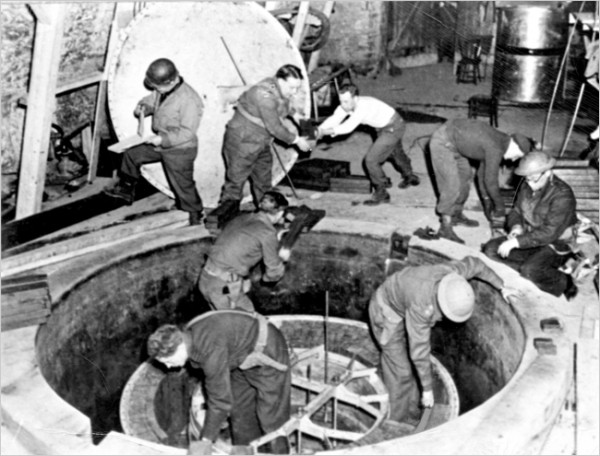
Allied troops disassembling the German experimental research reactor at Haigerloch, as part of the Alsos mission. Source: Wikipedia.
But it might appear to give an one of those questions that people have been asking since 1945: why did the Germans fail to get an atomic bomb? But here also is where the historians might be annoying and pedantic. There are very few historians who believe that Heisenberg (or any of the Germans working on the project) were actively trying to avoid making an atomic bomb. Frayn’s play in many ways tries to “sit on the fence” on this issue, but in doing so the play ends up creating something of the “false balance” fallacy, giving equal time to a side that is not considered very plausible by most. It leaves up in the air whether Heisenberg was trying to sabotage (consciously or not), making it seem that this is as equally plausible an interpretation as any other.
This can be misleading. Some members of the German atomic program — Carl Friedrich von Weizsäcker was the main one — did try to claim, after the war, that the reason the Germans didn’t make an atomic bomb was because they didn’t want to make an atomic bomb. Heisenberg himself generally danced elliptically around this claim, never quite (to my knowledge) advocating it, but also describing his actions during the war with enough vagueness as to leave open the possibility that part of him, perhaps subconsciously, didn’t succeed because he didn’t want to. The “Heisenberg was a saboteur” thesis was given prominence in Thomas Power’s Heisenberg’s War (2000), but other than that, it is not present in the claims of pretty much any other recent history on the topic.1
The reason why is simple enough: there isn’t any proof of it. In fact, it seems to have been offered up, quite post-hoc, as an explanation while the German scientists were being interred at Farm Hall and trying to grapple with the meaning of Hiroshima. It also doesn’t really square with any of the actions of the Germans during the war: they were working quite hard. If one is to assume they did any “sabotage,” it must have been extremely subtle, so subtle as to be indistinguishable from them doing the opposite of sabotage.2
Instead, through many other books (which I have discussed in another post), we have a pretty good picture of the German atomic program, how it was decided that it would pursue reactors, not bombs, and how paltry it was in comparison to the Allied effort. As I have stated elsewhere, the interesting historical question for me is less why didn’t the Germans but rather why did the Americans? Because the American case is the anomaly, not the German case. To decide whether an atomic bomb could be made rapidly with the knowledge available in 1941 involved a non-trivial prediction of the future. The Americans ended up (for various reasons) thinking it could be done; the Germans thought it was not worth the risk and expense. The Americans, in any case, barely pulled it off. Had their schedule been off by a few months, there would have been no atomic bombs ready for use during World War II, and the Manhattan Project still holds the world record for fastest time between deciding to make a nuclear weapon and actually having one.
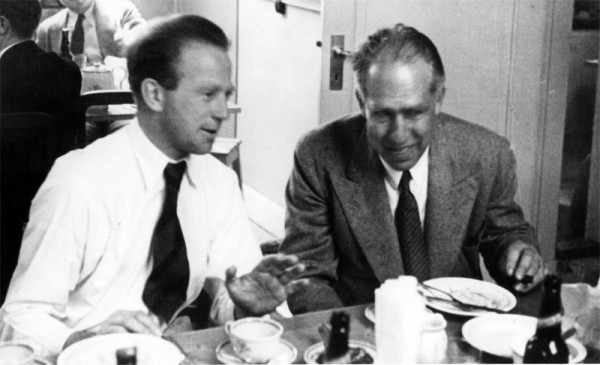
Heisenberg and Bohr in Copenhagen in the early 1930s. Source: Emilio Segrè Visual Archives, American Institute of Physics.
But I digress. If Copenhagen errs this is where it errs: it presents, on balance, a case that is remarkably sympathetic to the idea that Heisenberg et al. purposefully sabotaged the German bomb program. This is not what most historians see in the historical record. In its fallback position, the play presents the idea that the German bomb program was a failure on a very basic technical level — that nobody had run the critical mass equation correctly, that nobody had realized a few very basic ideas. And while it is true that there were some errors in the German calculations, they were not nearly so ignorant of these matters as the play would have you believe. They knew what plutonium was. They knew what atomic bombs could be. There were those within the German program (which was not one single program in any case, but several different groups) who knew that the critical mass of enriched uranium would be fairly low (German Army Ordnance thought in 1942 that between 10-100 kg of U-235 would give you a bomb, which is a spot-on estimate). Their problem was not one of basic technical errors. Heisenberg made some technical errors, but he was not the only one on the project.
There are many other, more interesting reasons to attribute the failure of the German bomb project. They lacked the fear of an Allied project that the Allies had of them. They feared over-promising with regards to a risky endeavor. During the later parts of the war, they suffered from supply setbacks due to their being targets of bombing and sabotage raids. They lacked anything like a Leslie Groves or Lavrenty Beria figure who could push the work through, against all odds and setbacks, in the limited amount of time that it might have been successful. But this is an area where I don’t want to overrepresent a historical consensus, though: practically every historian who writes on the topic of the German atomic bomb has a slightly different reason to argue why they didn’t make one. (If you read the volume of essays on Copenhagen I mentioned earlier, Copenhagen in Debate, the overwhelming feeling one gets is that practically every historian in there thinks Frayn is wrong, but they disagree greatly on exactly why the Germans didn’t get the bomb.)
So, does this mean that that I don’t like Frayn’s play? No! I actually like the play a lot. It just shouldn’t be anyone’s primary source for information about what happened during the German bomb project. But I don’t think it’s any worse in terms of confusing people than, say, many History Channel documentaries are. Popularizations of history often get things a bit wrong, sometimes a lot wrong — that doesn’t keep me up at night.
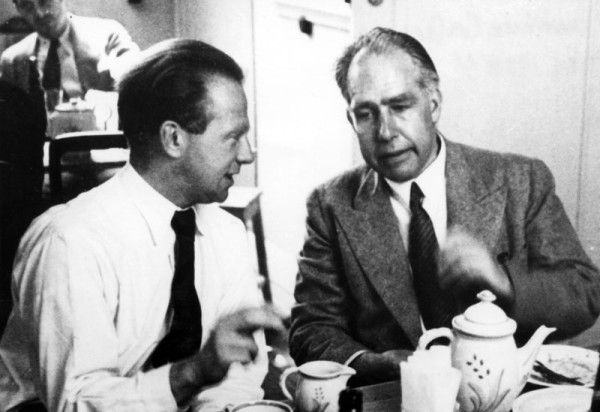
Same scene as above, different moment. Source: Emilio Segrè Visual Archives, American Institute of Physics.
The moral questions the play raises, the way it encourages people to view historical record as something complex and evolving, and the way in which it emphasizes that changing the questions you ask of history can lead you to see different aspects of it (in a deliberate analogy to Bohr’s Complementarity), are all quite important and interesting things to think about. I think Frayn’s play manages to get a lot right about what history itself is, and how it is formed on the back of inscriptions and memories and uncertainties and understandings that shift over time. In my mind, those are the really important things to get out of a play.
And let’s be honest: how many people — even professional historians! — would care about the ins-and-outs of the history of the German atomic project if not for this play? It raised the awareness of historical scholarship on this question to new heights, even if much of that scholarship is arguing against some of the implications people take away from the play. But it made that scholarship seem relevant. It makes people ask me about Heisenberg. That’s a good thing, and a needed thing. I would much rather people take an interest in this subject, and maybe run the risk of having different views than the majority of historians, than the contrary, which is that they don’t know or care anything about it at all. Of course, there are limits to this sort of attitude.
Frayn’s errors are ones of subtle historical interpretation, and don’t seem (in Frayn’s case) to be motivated by any sort of overarching political or historical agenda. (Unlike the case of von Weizsäcker, for example.) I’m inclined to give them a “pass” for the sake of making interesting entertainment that gets people asking questions. The one error that Frayn’s play essentially avoids is the more common popular error about the German bomb project, which claims that there was a true “race for the bomb” in which the world very narrowly avoided the Nazis getting nuclear weapons before the Americans did. This is a much more insidious sort of erroneous history, in my mind, because it is used to paper over the moral questions on the American side of things, and commits a multitude of factual sins in the process. The question of whether Heisenberg was a saboteur or not is not on that level, even if I think the bulk of the historical profession would not agree with Frayn that it is as likely an explanation for the German failure as any other.
- Frayn has always claimed that he was not advocating this thesis explicitly, but in his interactions with historians since writing the play (and it underwent a few revisions), he drew it (and himself) closer to the “Heisenberg was a saboteur” thesis. Perhaps this was a defensive gesture, perhaps he really believes it, perhaps it appeals to him as a playwright (Heisenberg-as-tormented is a much more interesting figure, as far as characters go, than Heisenberg-as-clueless or Heisenberg-as-someone-with-different-priorities). [↩]
- Heisenberg’s misquoted letter to Jungk, which set off the Bohr correspondence, was addressing this point — he was implying that under a dictatorship, trying to distinguish between a true-believer and someone who is just-playing-along is going to be almost impossible. However in the sentence Jungk omitted, he makes clear that he was not implying that he was a saboteur. In the edition of Brighter than a Thousand Suns that Bohr read, Jungk quoted Heisenberg as saying that, “In a dictatorship active resistance can only be practiced by people who seemingly take part in the system. When someone speaks openly against the system, he quite certainly deprives himself of any possibility of active resistance.” But Heisenberg then quickly backtracked: “I would not want this remark to be misunderstood as saying that I myself engaged in resistance to Hitler. On the contrary, I have always been ashamed in the face of the men of 20 July (some of whom were friends of mine), who at that time accomplished truly serious resistance at the cost of their lives.” Jungk did not quote the latter. See Cathryn Carson, Heisenberg in the Atomic Age: Science and the Public Sphere (New York: Cambridge University Press, 2014), 402-403. [↩]
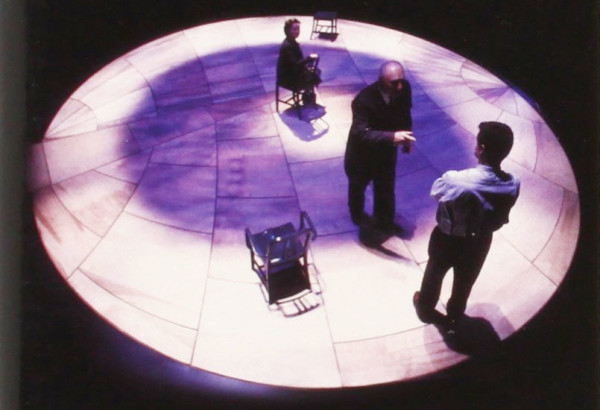

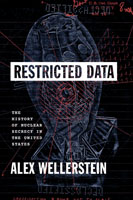
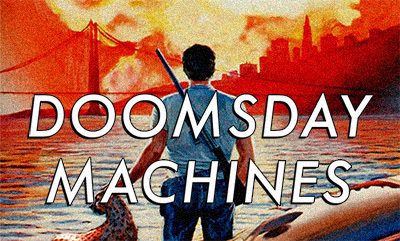
According to Rhodes book, Heisenberg slipped Bohr a copy of the German reactor plans during the Coopenhagen meeting. I always found it strange that this fact doesn’t get discussed more, since it seems like it would go at least some way towards clarifying Heisenbergs intentions as a) it shows he at least had something vaguely treason-ish in mind, as passing German war research to a foreign scientist would presumably have gotten him shot had the Nazi’s found out and b) generated at least some evidence of what happened independent of the later recollections of the two men, since surely Bohr must’ve passed the drawing along to allied intelligence, or at least described it to them.
There have been some articles on this. Jeremy Bernstein in particular has done some work on it. (See here, also.) It is extremely nebulous — there are some people who remember (years later) seeing something, some who don’t think there was anything, but not very much hard evidence all around. There is a document by Oppenheimer and Teller analyzing a pile that “consists of uranium sheets immersed into heavy water,” which corresponds with the type of reactor Heisenberg was working on in 1941, but there is much missing from the record that might give an indication of how much information was given or not.
I’m not sure, either way, if it sheds light on Heisenberg’s intentions. It is not a clear statement for or against a bomb to mention an experimental reactor design — you can interpret it multiple ways, depending on what one thinks Heisenberg was trying to accomplish (e.g., warning vs. recruitment vs. absolution vs. plea vs. who knows).
Alex–I was the moderator for a Smithsonian panel on the play, featuring Tom Powers and his critics (as well as Heisenberg’s son), in DC some years ago. Moderator was probably an apt term, since I literally had to get between Tom and critics, to keep the latter from physically attacking him. The amount of vitriol was impressive. I’ll have to confess that I always thought Heisenberg–like Teller–was essentially lazy, and simply not interested in getting involved in what he, and Teller, saw as an engineering, not a physics, problem. that’s still my view. But enjoyed your thoughtful take on the subject, as always.
Some of the critics have very strong opinions on the matter — in part because they really think the idea that Heisenberg was somehow taking a moral high-ground is very offensive, especially considering the propagandizing Heisenberg did during the war for the German Foreign Office. I can see that.
Heisenberg as an individual was just not who you’d want to put in charge of this sort of project. Building things and managing labs or people was not his forte. (Arguably Oppenheimer would not have been a good pick either, had their not been a Groves. And if Teller had been in charge of the US bomb work, there would not be a US bomb, I agree.) If the Germans had someone more like Fermi on their team, one can imagine them getting a pile working by the end of the war.
One thing I’d like to add, though, is that Heisenberg was not the only person working on the German program. This is one of the ways in which Frayn’s play can incorrectly focus attention on Heisenberg, I think. We know that Diebner’s team was in some ways more competent than Heisenberg’s team, even though Heisenberg treated Diebner with contempt. (It was Diebner, not Heisenberg, that suggested using cubes of uranium and not plates.) I don’t put the whole of the failure of the German project on Heisenberg; no bomb program is carried by just one scientist.